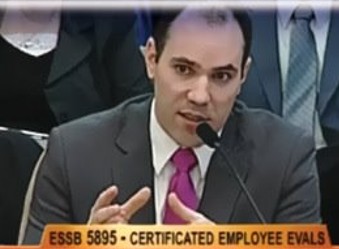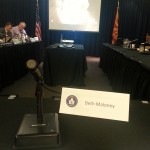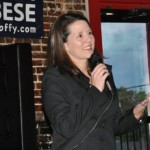“We did not put our ideas together. We put our purposes together.” Adam Kahane, Solving Tough Problems
John Prosser is there. A teacher leader involved in policy-making. He began as a middle school teacher in the Seattle Tacoma area, then went to law school, then back to the classroom. During a strike in 2011, he and his twin brother became leaders in their union by supporting the lines and eventually serving on the team that resolved the action. He is now a facilitator implementing the policy the strike resolved: how to fairly find the best match between displaced teachers and receiving schools.
In Part One I asked how teacher leaders will walk the talk when we finally get a seat at the policy making table. John revealed in recent phone calls that policy-making requires an intense level of responsibility, a spirit of conciliation, an unyielding obligation to get the facts right, and an inner knowledge of what it will take to change your mind.
When his committee began to negotiate teacher placement, those who had been adversaries in the strike had the eye-opening revelation that although the strike had served as a catalyst to get them together, they needed a new approach. They placed everything on the table and collaborated on setting a goal and finding a path. They were acutely aware that their decisions would impact every teacher and, by extension, every student in the district.
Solving Tough Problems, a memoir in which Adam Kahane writes about resolving problems from Apartheid to conflict in Guatemala, inspired the negotiations. John relates, “We said, ‘After all, if they can solve Apartheid, we can solve teacher-placement.'” Listening to and understanding the needs of the other party opened their eyes; discussing the craziest ideas from each party opened their minds. Fidelity to the facts secured a resilient policy.
A self-described “intellectual mercenary,” John is beholden to no point of view beyond that which the facts support. And sometimes that applies to his own views. A recent proposal that principals could use teacher evaluations in determining placement for displaced teachers seemed in direct conflict with the policy his team had crafted. A divisive fight seemed inevitable and healing wounds could be reopened.
Yet, driving home one day, John realized that the negotiated agreement already included language that principals must consider teacher evaluations – if a teacher had a poor evaluation or probationary status, the principal couldn’t displace them – thus avoiding a kabuki dance of the lemons. He wrote a memo that made it through the decision-making machinery and ameliorated the conflict before it began.
I do have a voice
It’s easy to say “I don’t have a voice,” but John says there are ways to be heard – through social media, blogs, and the old-school means of calling and writing your congressional representatives. He also suggests looking for opportunities to sit down and talk with representatives or their staff – maybe at a rally or public event. In his experience policy-makers want to know what teachers think and keep track of our opinions.
Yet John cautions that teachers need to do their own research and have a well-crafted message. Although politicians may listen, it’s an informed, research-based, well-articulated position that they hear.
Consider his experience after teachers at Garfield High in Washington state refused to administer a standardized test. Opinion leader and former Washington D. C. School Chancellor Michelle Rhee wrote an essay in the Seattle Times criticizing the boycott. John, acting in no official capacity, wrote a response on his personal blog that systematically deconstructed Ms. Rhee’s arguments.
Imagine John’s surprise when he received an email from none other than Diane Ravitch asking if he were real. She not only tweeted his post, but praised his essay in her own blog. (John’s a modest guy, but if you press him, he’ll admit that she really did call his essay “brilliant.”)
In summary, John says to inform yourself and act – make that phone call, write that blog – work on what most irks you, but work from knowledge and with an open-mind. Be prepared for frustration and hiccups in the process. But be prepared, too, to find your power.
What’s next?
In the conclusion to How Will We Walk the Talk? you’ll meet Holly Franks Boffy, a teacher leader who upon deciding that a personal life challenge would not become her identity, committed to train for and run in a 5K race. She ended up running all the way to a seat on the Louisiana State Board of Education.









